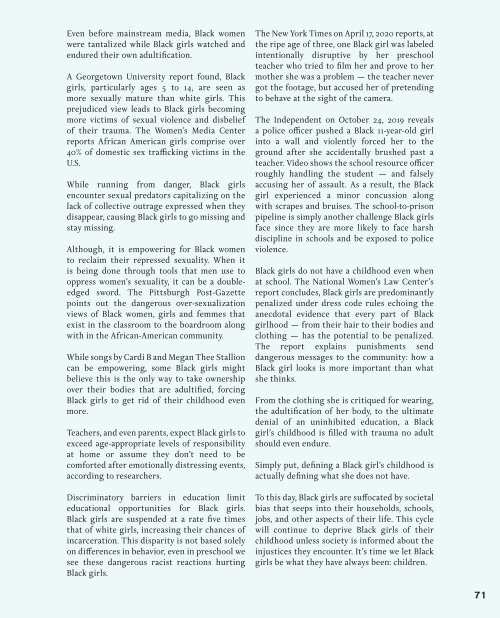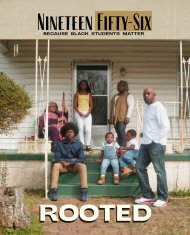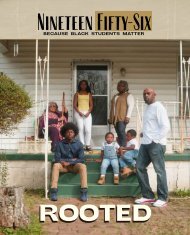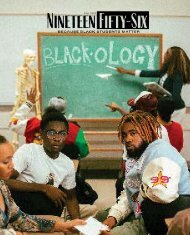Nineteen Fifty-Six Vol. 2 No. 5
This is the 2022 print edition of Nineteen Fifty-Six magazine. The theme "Movin' On Up" is inspired by the Black Panther Party.
This is the 2022 print edition of Nineteen Fifty-Six magazine. The theme "Movin' On Up" is inspired by the Black Panther Party.
Create successful ePaper yourself
Turn your PDF publications into a flip-book with our unique Google optimized e-Paper software.
Even before mainstream media, Black women<br />
were tantalized while Black girls watched and<br />
endured their own adultification.<br />
A Georgetown University report found, Black<br />
girls, particularly ages 5 to 14, are seen as<br />
more sexually mature than white girls. This<br />
prejudiced view leads to Black girls becoming<br />
more victims of sexual violence and disbelief<br />
of their trauma. The Women’s Media Center<br />
reports African American girls comprise over<br />
40% of domestic sex trafficking victims in the<br />
U.S.<br />
While running from danger, Black girls<br />
encounter sexual predators capitalizing on the<br />
lack of collective outrage expressed when they<br />
disappear, causing Black girls to go missing and<br />
stay missing.<br />
Although, it is empowering for Black women<br />
to reclaim their repressed sexuality. When it<br />
is being done through tools that men use to<br />
oppress women’s sexuality, it can be a doubleedged<br />
sword. The Pittsburgh Post-Gazette<br />
points out the dangerous over-sexualization<br />
views of Black women, girls and femmes that<br />
exist in the classroom to the boardroom along<br />
with in the African-American community.<br />
While songs by Cardi B and Megan Thee Stallion<br />
can be empowering, some Black girls might<br />
believe this is the only way to take ownership<br />
over their bodies that are adultified, forcing<br />
Black girls to get rid of their childhood even<br />
more.<br />
Teachers, and even parents, expect Black girls to<br />
exceed age-appropriate levels of responsibility<br />
at home or assume they don’t need to be<br />
comforted after emotionally distressing events,<br />
according to researchers.<br />
Discriminatory barriers in education limit<br />
educational opportunities for Black girls.<br />
Black girls are suspended at a rate five times<br />
that of white girls, increasing their chances of<br />
incarceration. This disparity is not based solely<br />
on differences in behavior, even in preschool we<br />
see these dangerous racist reactions hurting<br />
Black girls.<br />
The New York Times on April 17, 2020 reports, at<br />
the ripe age of three, one Black girl was labeled<br />
intentionally disruptive by her preschool<br />
teacher who tried to film her and prove to her<br />
mother she was a problem — the teacher never<br />
got the footage, but accused her of pretending<br />
to behave at the sight of the camera.<br />
The Independent on October 24, 2019 reveals<br />
a police officer pushed a Black 11-year-old girl<br />
into a wall and violently forced her to the<br />
ground after she accidentally brushed past a<br />
teacher. Video shows the school resource officer<br />
roughly handling the student — and falsely<br />
accusing her of assault. As a result, the Black<br />
girl experienced a minor concussion along<br />
with scrapes and bruises. The school-to-prison<br />
pipeline is simply another challenge Black girls<br />
face since they are more likely to face harsh<br />
discipline in schools and be exposed to police<br />
violence.<br />
Black girls do not have a childhood even when<br />
at school. The National Women’s Law Center’s<br />
report concludes, Black girls are predominantly<br />
penalized under dress code rules echoing the<br />
anecdotal evidence that every part of Black<br />
girlhood — from their hair to their bodies and<br />
clothing — has the potential to be penalized.<br />
The report explains punishments send<br />
dangerous messages to the community: how a<br />
Black girl looks is more important than what<br />
she thinks.<br />
From the clothing she is critiqued for wearing,<br />
the adultification of her body, to the ultimate<br />
denial of an uninhibited education, a Black<br />
girl’s childhood is filled with trauma no adult<br />
should even endure.<br />
Simply put, defining a Black girl’s childhood is<br />
actually defining what she does not have.<br />
To this day, Black girls are suffocated by societal<br />
bias that seeps into their households, schools,<br />
jobs, and other aspects of their life. This cycle<br />
will continue to deprive Black girls of their<br />
childhood unless society is informed about the<br />
injustices they encounter. It’s time we let Black<br />
girls be what they have always been: children.<br />
71


















